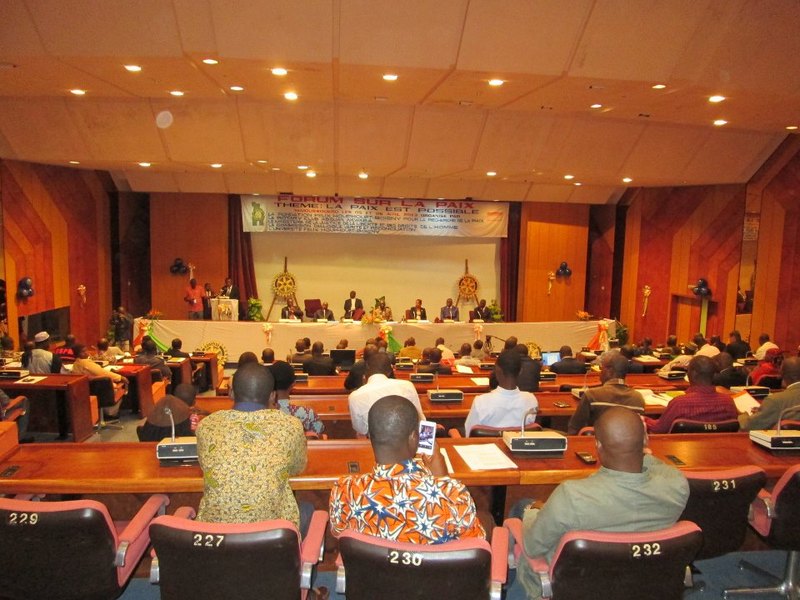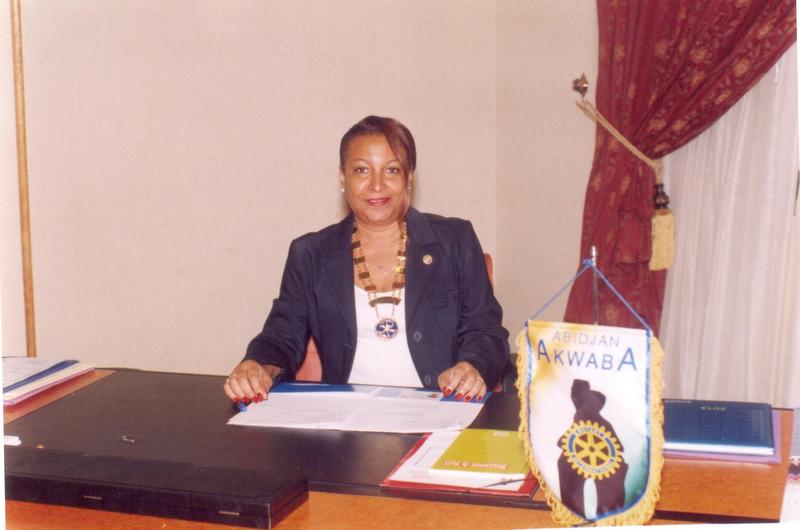ROTARY ABIDJAN AKWABA PEACE FORUM
Besides these three organizing bodies, the forum was attended by the following institutions and structures:
The Dialogue, Truth and Reconciliation Commission (CDVR)
The University Alassane Ouattara, Bouake
The UNESCO Professorship for the Culture of Peace, University FHB,
The Ecole Normale Superieure (ENS),
The Centre for Studies, Research and Action for Peace
The Ivorian National Commission for UNESCO,
The Academy of Sciences, Arts and Cultures of African Diasporas
The UN Operations in Côte d'Ivoire (UNOCI),
The representatives of traditional chiefs,
The representatives of religious denominations (Priest, Imam, Pastor, Doctor of the Baha'i Faith)
Representatives of many organizations of civil society working in the area of the search for peace.
The Forum reported participation of eminent professors from national universities.
Why this Forum? Such a Forum for what reason?
Conflicts are specific to humans. Where two or more persons are live, there exists potential or actual conflict, because the interests and needs of each other oftentimes clash.
But that does not mean that human communities must destroy each other. Peace is a necessity to live together. But the prerequisite for that peace to be sustainable, it must be built on a solid foundation of which education occupies a special place. In fact, the problem is to be grasped by the roots by building peace in the heart and minds of men and women in order to make them peace actors.
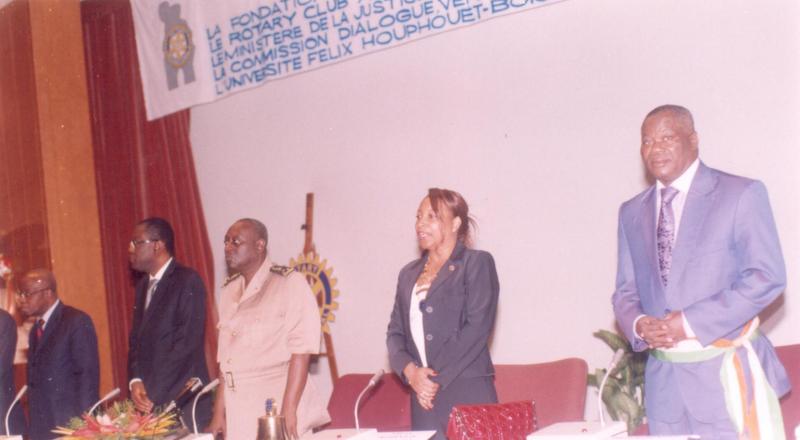 Thus the concept of "Culture of Peace" was developed for the first time on a global scale by UNESCO at the International Congress on "Peace in the minds of men", held in Yamoussoukro, Côte d'Ivoire, in 1989.
Thus the concept of "Culture of Peace" was developed for the first time on a global scale by UNESCO at the International Congress on "Peace in the minds of men", held in Yamoussoukro, Côte d'Ivoire, in 1989.
In order to move from the concept to action, that is to give a concrete shape to peace in our country that has just experienced a crisis which seriously undermined the peace, the initiators of this Forum have chosen the theme "peace is possible.»
This topic addresses two concerns: firstly to contribute to reconciliation and social cohesion, and secondly to strengthen "the understanding between peoples for a better world" through the following objectives:
Inform the national community on the initiative of creating a center of international studies for conflict prevention/ resolution and the search for peace in Côte d’Ivoire.
Raise awareness about the existence of Scholarships granted by the Rotary Foundation.
Provide a brief inventory of structures and institutions providing training on peace culture.
The work of the Forum was structured around the following points:
The opening ceremony,
Communications in plenary
The workshops
The Yamoussoukro Declaration.
The opening ceremony itself began with a libation session led by the Notable YAO Kouassi Gustave spokesperson of traditional village chiefs of the city of Yamoussoukro, and then came the hymn of Rotary.
The series of speeches began with the Mayor of Yamoussoukro, Mr. Jean Gnanagbé Kouakou Kouadio. After greeting the audience on behalf of the chiefs and council, he presented the symbolism of the choice of the city of Yamoussoukro and the opportunity to organize such a forum. He ended his speech by thanking all the participants and organizers of the forum.
The second speech was said by Prof. Jean Noël Loukou, Deputy Secretary General of the Felix Houphouet-Boigny Foundation for Peace Research.
On behalf of the foundation, he wished a warm welcome to all the guests and participants. He stressed that this forum represents a framework for collaboration between the Foundation and the Rotary Club Abidjan Akwaba.
He also referred to the creation of an international research center for the prevention and resolution of conflict and the search for peace. He recalled the participation of Côte d'Ivoire in a recent Peace Forum held in Angola from 26 to 28 March 2013 on the own initiative of UNESCO, the African Union and the Government of Angola; Forum during which the UNESCO Professorship for the Culture of Peace and Felix Houphouet-Boigny Foundation, as the "focal point", made commitments to implement projects for the Culture of Peace, with the support of the Ivorian National Commission for UNESCO.
The opening ceremony ended with a family photo on the esplanade of the FHB Foundation for Peace Research.
The inaugural lecture on the theme of the forum "peace is possible" was presented by the President of Rotary Akwaba Abidjan, Mrs. Ramata Dinah CAMARA.
She has articulated her paper around two points:
Point 1: Human Rights
Point 2: Education and Health
In an introductory section, where she spoke about the concept of peace through its many and varied meanings, she briefly reviews the history of conflicts past and present before saying that one must be crazy to believe in a world without war.
With respect to point 1 (Human Rights), she referred to the early commitment of Rotary in the search for peace at the United Nations which continues today through its involvement in peace acts around the world. She also presented the Carter Center established in 1982 that shares the same beliefs as the Rotary in conflict prevention and supervision of elections around the world.
Point 2 (Education and Health) was an opportunity to present the actions of Rotary. It is, among other things:
Awareness about the values of peace,
Ensuring access to water, education, health,
Fight against hunger.
Rotary also develops worldwide programs of mediation and conflict resolution for young people through the Rotary Centers.
To better demonstrate that peace is possible, the President of Rotary Abidjan Akwaba quoted first, the various reports that mention the regression of conflict since the 90s and the peaceful resolution of conflicts. These reports also show the close relationship between poverty and conflict. Apart from what is given us to see, she said, we are less violent than our ancestors.
Then she quoted various authors who through their work mention the disappearance of regional conflicts in favor of internal conflicts. The instigators of these conflicts are often mafia groups: drug traffickers, terrorists, etc...
Her speech ends on a hopeful note, with a strong optimism, because for her, the whole world is resolutely turned towards peace.
Paper 1: << Introducing the Felix Houphouet-Boigny Foundation for Peace Research: a unique institution in the service of peace >>, by Dr. Diénéba Doumbia, Director of the Research Department of the peace, FHB Foundation.
To begin with, Dr. Doumbia Diénéba was keen to introduce the late President Felix Houphouet-Boigny, man of peace, builder of modern Côte d’Ivoire and all the values he cultivated such as dialogue, fraternity and peace.
Then she presented the Felix Houphouet-Boigny Foundation for Peace Research through its mission and its objectives.
We found out that FHB Foundation seeks to establish a culture of peace at the national and international level and to serve as a framework for exchange and dialogue. It conducts various activities such as research, training through seminars and workshops, and mentoring trainees.
FHB Foundation also prospects various projects such as:
Sociocultural activities (biennial tales);
Creation of a peace museum for exhibitions;
Publication of brochures and instructional manuals on peace;
Organizing contradictory debates contests;
Establishment of a specialized unit made up of traditional and religious leaders.
Dr. Doumbia did not fail to mention the partnership that the Foundation has developed with universities, associations, NGOs working in the field of peace.
She closed her remarks by quoting President Felix Houphouet-Boigny, who always wanted the Foundation that bears his name to have an international reputation and outreach.
Paper 2: << Education to the values of peace culture>>, by Dr. Doumbia Dieneba
After a brief introduction, which tended to show the difficulties of teaching the culture of peace, she divided her speech into two parts: on the one hand, the identification of the values of peace culture, and other hand, education to the values peace culture.
Regarding the values of peace culture, she distinguished seven, namely:
- Democracy, of which everyone speaks without knowing what it is;
- Law which no one is supposed to ignore, but which in reality is widely misunderstood in society;
- The human rights are violated everywhere;
- Non-violence that was the credo of exceptional men worldwide;
- Tolerance, which is easier said than done;
- Solidarity that must be rebuilt on a large scale even in Africa;
- Protection of the environment.
The question that arises is how to educate to these values?
According to the speaker, the following steps are necessary for an effective education to peace culture:
- Using education methods and techniques that emphasize the learning activity that puts the learner at the center of the learning process through active teaching methods;
- Promoting mastery learning;
- Teachers as role models to others;
- Translation of concepts of peace such as democracy into behaviors;
- The erection of behavioral models for the younger;
- Promoting debate;
- Learning to live together;
- Education to reconciliation through the curricula;
- Promoting commitment on part of the citizens.
At the end of the speech, the discussion that followed included both contributions and questions to two speakers of the morning session.
The contributions that were very rewarding, discussed various aspects:
- The call for finding ways to implement the resolutions of previous seminars and workshops at the risk of giving in repetitions and circling without taking steps forward;
- The incentive to work constantly in favor of peace and not stay at the margin, because peace is a permanent quest. Otherwise, how to understand that the concept of peace culture which was coined in Côte d’Ivoire and exported around the world is not a reality for us?
- Teaching the value of regard to avoid conflicts;
- The incentive to sort out the traditional values and boil them down to their positive aspects;
- Reflection on a consensual meaning of the word peace at risk of having to teach, not the culture of peace, but the cultures of peace.
- The idea that a peaceful society must involve peace in the families.
The exchanges allowed both speakers to provide some answers to the concerns of the participants.
Paper 3: << The university and the issue of peace >>, by Dr. Gnanagbé Gogoua, Chief of Staff of the Presidency of the University Felix Houphouet-Boigny
In the introduction, Dr. Gnanagbé placed the mission of the university that is teaching and doing research. Then he presented peace as the object of study at universities before prior to questioning the place of the concept in the academic training offers and opportunities. Therefore, two areas were identified:
Point 1: Peace in training opportunities at university
At the University, peace is a subject of study: irenology which requires multidisciplinary studies. There is at university a science that deals exclusively with peace. It identifies the values, invents peace education teaching methods and identifies ways of conflict resolution at all times. By contrast, in times of crisis, it educates for citizenship, popularizes or invents ways, and makes prevention a priority.
Therefore, the university is an institution of peace: it teaches the values of peace. Through its purposes, it produces and popularizes the fruits of research. Through training, it transforms the minds of learners.
Point 2: Place of Peace at the University Felix Houphouet-Boigny,
At this stage, the speaker analyzed the particular case of the University Felix Houphouet-Boigny. According to him, if peace is restored at the University Felix Houphouet-Boigny, it is likely that the country will find a sustainable peace.
To this purpose, he first took stock of the prevailing situation of the University Felix Houphouet-Boigny, which used to be a haven of peace, but which has gradually fallen into decay since the 80s to become a battlefield.
What to do to restore the prestige of the University Felix Houphouet-Boigny today?, He wondered.
The management team of the University headed by Mrs. Ly Bakayoko Ramata, Professor in the Department of Health Sciences is eager to heal the wounds left by the post-election crisis.
Thus, under the current actions, three commissions have been established, namely:
- Ethical and ethics Commission to locate the rights and responsibilities of teachers, students and administrative staff;
- The listening and counseling Commission to assist students who are victims of the post-election crisis;
- University police Commission to manage crises on campus.
The review of student associations is underway to train students and help them to organize not only lucrative but also socio-cultural activities.
Dr. Gnanagbé ended his lecture with a call to all to rebuild a peaceful environmental the University where peace and security must prevail.
Then the following suggestions came out of the discussion:
- To go further in thinking about the quest for peace by encouraging the teaching profession to provide a new benchmark for school pupils and students;
- To increase the involvement of students in decision-making at the University Felix Houphouet-Boigny;
- To encourage and support the actions of associations and NGOs working for building peace.
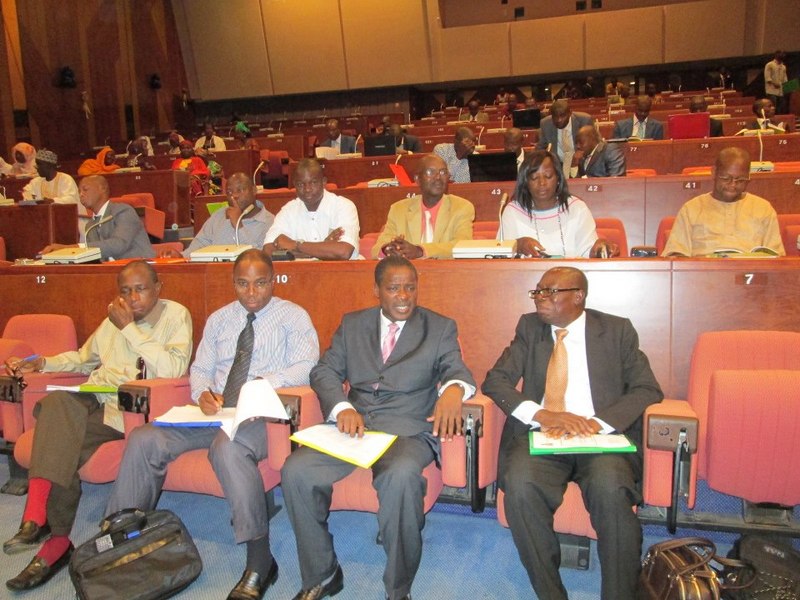 Paper 4: it was presented by Professor Sery Bailly, Commissioner of the Dialogue, Truth and Reconciliation, on the theme "CDVR in action: a space for dialogue, a work of truth and justice and true reconciliation to embrace peace. »
Paper 4: it was presented by Professor Sery Bailly, Commissioner of the Dialogue, Truth and Reconciliation, on the theme "CDVR in action: a space for dialogue, a work of truth and justice and true reconciliation to embrace peace. »
From the outset, he understood the concern of Ivoirians who question the action and role of CDVR in the quest for reconciliation in the country. This concern, from his point of view, reflects both the despair and hope that Ivoirians place in this structure. In its development, he presented CDVR as a space for dialogue which is part largely part of an inclusive and participatory process. For the modalities of implementation of the dialogue, he stressed the importance of the words of healing and consolation, especially after severe wounds caused by the recent crisis that has rocked the country. Actors sought in this process include political, traditional and religious leaders, women and youth.
According to the speaker, one of the conditions for dialogue is that it should be used to establish the truth and overcome the limitations of retributive justice. This has been the second point addressed in his speech.
Linking truth to justice, he noted that both concepts are essential to reconciliation and for which two triptychs are considered, namely: truth-justice-reconstruction, on the one hand, and truth-justice-compensation, on the other hand.
Finally, he insists that true reconciliation is one that has managed to transform suffering into an opportunity, the past as asset for the future. Netherveless, this kind of reconciliation does not remove, as far as he is concerned, any possible conflict but makes available the means to manage and overcome it at the psychological and institutional levels.
Paper 5: It was presented by Mr. Eclador NANA, Past Assistant Governor of Rotary International, and focused on the question of peace through service. The speaker recounted his meeting with Rotary. A meeting that began in 1990 and allowed him to enriching experiences and allowed him to realize that the most important thing in life is to work for others. According to him, devoting one’s life to others is certainly one way to build peace. Referring to the contribution of Rotary to peace, he stressed that the organization meets the needs of individuals in health, nutrition, education, improving quality of life, solidarity, cooperation, tolerance and friendship. It is aptly for this reason that, in accordance with its philosophy which is to work for an understanding between peoples, Rotary, present in more than 200 countries and territories, selected in 2012-2013 to focus its actions on the theme "peace through service."
Paper 6: It was presented by Professor Gerard Dago Lezou, holder of the UNESCO Professorship for Peace Culture Felix Houphouet Boigny, University of Cocody-Abidjan on the theme "Education and Research, peace factors: the contribution of UNESCO Professorship for Peace Culture from 1996 to 2012 ".
Through the history of the UNESCO Professorship for Peace Culture, he noted that this organization was born out of a collaboration of Rectors and Presidents of Universities at the sub-regional workshop on the current conflict and the culture of peace held in June 1995 in Abidjan by the National Commission of UNESCO. This Professorship, he said, was created in response to numerous armed conflicts, social unrest and political crises in Africa. It stresses the importance of peace and works for the promotion of education, research on human rights and democracy. Professor Gerard Lezou presented the achievements of the UNESCO Professorship since its inception in the field of training, research and field activities.
Regarding the first area, he presented the types of training, courses and learner profiles. He subsequently enumerated the training activities carried out by this organization. In terms of research, the work of the UNESCO Professorship will focus on four areas, namely:
• Conflict prevention, management and resolution;
• Humanitarian Action and Sustainable Development;
• International Law and Political Sciences;
• Project management and humanitarian logistics.
These areas have resulted in thesis defended and others are ongoing. On field activities, Professor Lezou noted that these activities constitute the major innovation of the UNESCO Professorship. These actions include, he said, different social strata. They aim to resolve social conflicts that undermine social cohesion.
Paper 7: Last but not least important paper was the testimony of Dr. Kouame Rémi Oussou, of University Alassane Ouattara of Bouake. As the first African grant recipient of the Rotary Centers for International Peace in Masters in International Relations and Conflict Resolution in Tokyo, he spoke of the experience gained in the context of international studies. He insisted especially on the impact of these studies on his professional career. Indeed, the training which lasted two years was, for him, an opportunity to deepen his background knowledge in anthropology and sociology. He was therefore faced with a variety of experiences and has established a network of relationships that allowed him to join the United Nations System. So he worked with UNDP in the Central African Republic in the Disarmament, Demobilization and Reintegration (DDR) program from 22 April 2009 to 10 July 2010.
He ended his remarks by inviting the Rotary International to provide more scholarships to African researchers in the context of promoting the culture of peace continent wide.
The Forum enabled participants to work in two workshops, namely:
Workshop 1: Peace actors: inventory of training for jobs in the peace field and prospects;
Workshop 2: Training programs for peace: innovations in content, teaching methods, development and dissemination of educational materials.
Workshop 1
To better understand the main aspects of the topic, the workshop developed a guidance questionnaire that can be divided into three areas, namely: the need for trainingon peace culture, the current state of training on peace culture, conflict prevention and resolution and prospects.
On the first point, the discussions emphasized the importance and need for training on a culture of peace, prevention and resolution of conflict, because peace is the basis for all development.
Insofar as it is recognized that peace is not a spontaneous data, it must be matured, grown, maintained so that citizens incorporate its values in their daily behaviors.
Eventually, a training culture of peace will achieve the following objectives:
- Provide to citizens the conceptual and practical tools in order to make them actors and citizens committed to peace, including conflict prevention;
- Study peace and the conditions for its feasibility;
- Invent new paradigms for training to help build a culture of peace;
- Supplement the shortcomings of social mechanisms for resolving social conflicts.
On the second point, the workshop recognized that three types of efforts are being made in Côte d'Ivoire for the promotion of a culture of peace.
The first of the kind is the creation of training institutions on culture of peace. Two of them were identified. This is the UNESCO Professorship for Culture of Peace, University of Felix Houphouet-Boigny Cocody and the Studies and Action Research Center for Peace (CERAP) that offer their listeners theoretical training and courses in Human Rights, Conflict Management, Prevention and Resolution, Humanitarian Action and Peace Culture.
The Workshop welcomed the positive nature of these efforts. However, it lamented the limited specialized institutions for peace and, thus, recommends to increase their numbers.
The second type is the integration of the culture of peace in the training of teachers.
However, the workshop regrets that this policy is limited to a few structures such as the Ecole Normale Superieure (ENS), the Training and Pedagogical Animation Center (CAFOP) and the National Pedagogical Institute of Technical Education (IPNET) and a minority of teachers. As a recommendation, it suggests to expand and develop this policy so that it touches the entire teaching staff.
The third type is the use of a wide variety of educational materials to promote the culture of peace, conflicts prevention and resolution.
These are works of scientific research, textbooks, audiovisual media (radio, Internet, television, radio show recorded on DVD, CD, and photography), print (newspapers, magazines), the arts and culture (stories, drama, and poetry), games (competitions) and sermons.
The analysis of efforts for peace has also identified new business in the field of peace. These are, but are not limited to, mediation and its variants (negotiator, facilitator, and conciliator), the trainer of trainers on culture of peace, and human rights and election observer.
Finally with regard to the third point, the discussions have highlighted the desirability of creating a Center for International Studies for conflict prevention and conflict resolution.
This would be an important tool for promoting the culture of peace, because it will:
- Create a framework for teachers and researchers who wish to deepen their research on culture of peace;
- Contribute to the training of trainers specialized in human rights, culture of peace, management, conflicts prevention and resolution;
- Create jobs for in the field of peace;
- Promote greater openness of Côte d'Ivoire to the outside world with the Ivorian students being more mobile going to train abroad and foreign students coming in Côte d'Ivoire in the Center for International Studies and Conflicts prevention and Conflict resolution that Rotary will create.
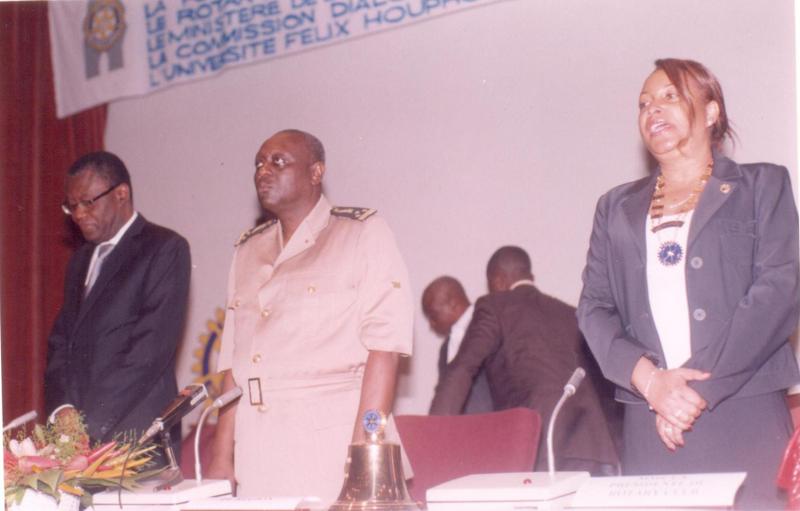 Workshop 2 has adopted the following:
Workshop 2 has adopted the following:
1. Identification of values shared by the actors in a school of peace
• Faith in peace
• Leadership of the management team
• High sense of responsibility
• Brotherhood, love and respect for each other (teacher-teacher, teacher-learner, etc.)
• Tolerance
• Solidarity
• Environment protection
• Non violent Communication
• Role model
• Fairness, rigor and openness
• Democratic culture
• Self-sacrifice
• Respect for the law, human rights
2. The activities of this school
The school must conduct research, training (initial training, continuing education) and socio-educational and cultural activities:
Pedagogical level
It will use active methods (cooperative, participatory and interactive) that focus on behavior change, know-how, know-being of learners.
• Language learning to access the culture of the other
• Biographical studies of leading figures in the field of peace
• Introduction to the analysis of political discourse
• Education of political leaders and their supporters to the culture of peace
• Education for democratic citizenship
• Study of proverbs and stories in training programs
• Education of national languages
Socio-educational level
• Organizing camps in different parts of Côte d'Ivoire in order to enable learners to get acquainted with local cultural practices and national institutions of social control such as masks, Poro, joking kinships, etc.
• The school cooperatives, clubs and associations.
At the cultural level
Promoting peace through theater, visual arts, dancing, painting, sports, etc.
3. A School of Peace: learning laboratory for democratic values, attitudes and behaviors of peace
• Integration and translation of democratic values through their teaching practices;
• Promotion of local values and traditions;
Involvement of all stakeholders of peace in learners’ education (parents, religions, NGOs), etc.
• Encouragement of education throughout life
• Using participatory methods such as simulation, role play, cooperation, teamwork, forum theater, debate with conflicting views, etc..
• Development of civic spirit and active citizenship.
4 –Conducive Physical School environment (architecture, furniture, etc..) and a favorable atmosphere (collaboration, teamwork, etc.).
- A pleasant and conducive learning environment (keep as far as possible the bad examples such as bars, smoking rooms, which are places frequented by people of dubious character, etc.).
- Promotion of self-stimulation among peers (best in reading, etc.).
- An environment of healthy competition;
- A suitable environment for the cultures of learners;
- The furniture adapted to the educational activity.
5 - How to organize the reception and supervision of trainees?
- Immerse the learner upon arrival in the regulations and standards governing the establishment;
- Establish the tutoring system to create a formal mutual enrichment relationship in the context of the culture of peace;
- Promote flexible integration of learners.
"PEACE IS POSSIBLE"
DECLARATION OF the Yamoussoukro FORUM ON PEACE
Recalling that peace is one of the first human rights,
Recalling that people yearn for lasting peace, freedom and reconciliation and justice,
Considering that peace is essential for sustainable development,
Considering that, during the crisis, including Côte d'Ivoire, youth are both key players and victims
Convinced that peace is possible through education,
Recalling that Rotary International, the Felix Houphouet Boigny Foundation, the Dialogue, Truth and Reconciliation Commission aim to contribute to the promotion of a culture of peace and reconciliation and recognizing their role in education about the values of peace,
We, the participants in the Forum on Peace in Yamoussoukro, titled "Peace is Possible", held on 5 and 6 April 2013, adopt the following statement:
- All human beings have the right to live in peace away from violence, persecution, inequality and suffering.
- The divisions that often create self-interest and political ideologies cause dissension and conflict.
- Tolerance is a fertile ground for peace by allowing us to accept our differences and respect everyone's right to express freely their opinions and live according to their political,religious and culturalchoices.
- The principles of democracy and democratic governance guarantee equal protection of people from different backgrounds and beliefs.
- All means must be implemented to promote the ideals of peace, peace education necessary to attitudes and behaviors change among citizens.
We, the participants, are committed to take all appropriate measures in our respective areas of activity in order to contribute to the implementation of education for a culture of peace.
- We encourage young people to get involved in new professions related to peace.
- We recommend the creation of an international center of education, conflict prevention and resolution and search for peace in Côte d'Ivoire.
- We urge all citizens to be active peacemakers.
- We call on all political leaders to emphasize the peaceful resolution of conflicts and not to resort to war.
- We ask them to put in place mechanisms and research institutions, either as peace backup, maintenance and/or peace promotion.
Then peace is possible. Let's work together!
Yamoussoukro, April 6, 2013



